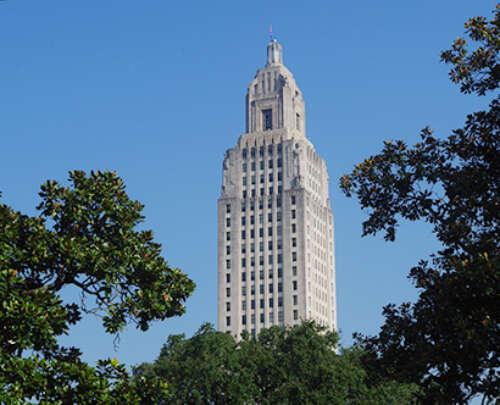
We have been watching a number of bills in the Louisiana legislature that would prevent “foreign adversaries” and in particular China from buying land in Louisiana, whether because it is too close to military bases or because it is agricultural land. Now that the session is over, we’re closer to knowing their outcomes.
Senate Bill 91 is dead for now but could be reintroduced in a future session. It prohibited citizens of China, Cuba, Iran, North Korea, Russia, and Venezuela from purchasing property within 50 miles of military bases. As we pointed out, that radius would prevent anyone from the named countries from buying a home in New Orleans, the West Bank, the Northshore, and all about about a nine mile stretch of I-10 but not in Baton Rouge. Had it passed, it would have created brutally discriminatory conditions for people from the affected countries that would have been unlikely to stand up to a legal challenge.
One that did pass is House Bill 537, which is even more drastic, but the process of getting it to a vote resulted in a drastically neutered bill. It prohibits “the acquisition of immovable property” by citizens of the same countries. Period, full stop. However, the law would not apply to a US citizen, whether by birth or the naturalization process, or a lawful permanent resident. HB357 and House Bill 125 share similar concerns, though HB125 makes them clearer. It wants to “restrict a foreign adversary with an ownership interest in a corporately formed business from owning or having an interest in agricultural land.”
The anxiety both bills claim to address is the concern that foreign adversaries will take control of Louisiana’s contributions to the nation’s food supply and weaponize it against the United States. Agriculture Commissioner Mike Strain testified, “One of the things we’re worried about is … they buy up all our ag land and take it out of food production and put it into something else. Because foreign adversaries do not have our best interests in mind at all.”
“One of the big issues is we simply don’t know how much land China and other adversaries may own because it’s tied up in multiple layers,” Strain said. We do know that 18 percent of Louisiana agricultural land is under foreign ownership but we don’t know how much if any belongs to people from the six countries designated in the bill, nor do we know if our food sources are being in fact weaponized. Information we don’t have is being treated as a secret with presumed malign intent, so legislators are taking stands just in case.
Both bills passed and have been sent to Governor John Bel Edwards for approval. So far, he has yet to sign them. He has signed other bills that came out of the session, so it appears he is considering vetoing them. He also has anti-LGBTQ bills on his desk, so there are questions about how many bills he will veto, and if his vetos would lead to a special session where the legislature could override them.
We see the legislation as an effort on the part of Republican state politicians to capitalize on the anti-immigrant sentiment that animates part of the conservative base, and 17 other states including Arkansas, Oklahoma, Missouri, and Mississippi passed variations on the law in this session as well. They’re addressing issues that they aren’t sure exist and making theatrical choices when there are more practical ways to secure America’s food infrastructure.
These measures also invite problems for the states that pass them. Florida is currently being sued for passing a similar bill. According to a statement by the Florida ACLU, “Gov. DeSantis has argued that this law is necessary to protect Florida from the Chinese Communist Party and its activities. But this misguided rationale unfairly equates Chinese people with the actions of their government, and there is no evidence of national security harm resulting from real estate ownership by Chinese people in Florida.” A similar bill in Texas was first watered down and then pulled from the hearing calendar, effectively killing it for the most recent session.
The impacts of these bills in Louisiana have been diminished by amendments, and they would almost certainly face legal challenges if Edwards signs them into law. But even if he doesn’t, we’re concerned by the efforts of state legislatures to insert themselves into federal issues. Regardless of the final outcome of these bills and those like them in other states, they are the first steps in opening that door.
Are you having legal issues with Immigration? Do you need legal representation?